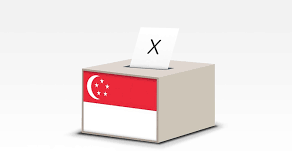Why age should not be the only measure of political maturity.
It’s a familiar argument: 18-year-olds are too immature and inexperienced to cast their votes at the polls. One viral TikTok of someone preparing for voting day — a “GRWM for Polling Day” — has people questioning whether this is the right age to make political decisions.
Is it fair to say political opinions should only be in the hands of the mature? Sure, but I wasn’t particularly concerned about politics when I was 18. My worries were more about my ‘A’ Level grades, surviving National Service, and possibly getting a decent opening line for a Tinder match. Politics just didn’t register. Maybe it wasn’t that I didn’t care, but I didn’t vote, so I didn’t need to care. The cycle repeats: no vote, no political engagement.
The point is, at 18, I had little say in my future. Or so I thought. As I turned 21, the political maturity that was supposedly supposed to arrive with age felt more like a prescriptive narrative. I was suddenly “mature enough” to vote — according to the logic of those who set the rules.
Of Political Maturity and Cognitive Ability
Every so often, questions about lowering the voting age resurface in Parliament. MPs like Dr. Lim Wee Kiak, He Ting Ru, and others have raised the topic, while Minister Chan Chun Sing has responded, emphasizing that voting requires experience and maturity. The question of whether 18-year-olds are mature enough has remained elusive. It’s argued that younger minds are “too easily influenced” by societal trends, like “woke ideas” or social justice movements, and therefore unfit to make political decisions.
But what does “maturity” mean in this context? Is it age? Is it experience? According to studies, cognitive abilities in 18-year-olds are not so undeveloped as to be incapable of forming political opinions. Many youths are concerned with issues of gender equality, mental health, and economic change. These are not trivial concerns but reflective of deeper societal shifts. Yet, these opinions are often dismissed as “immature” or part of an over-hyped social movement.
Freedom and Financial Independence
Another argument against allowing young people to vote is that they don’t have “skin in the game.” Those with financial independence — people who own property or have stable careers — are seen as the ones who should weigh in on political matters. But what about those who are just starting their journey to financial independence? Those working through school loans, dependent on family for basic needs, but still navigating their world and seeking change? Their concerns might be more aspirational but are just as valid.
This logic closely mirrors early versions of democracy, where only wealthy, property-owning white men could vote. Today, we don’t question the concept of economic stake when it comes to votes, but we should. Social and political concerns that seem “aspirational” are just as valuable as those rooted in wealth. Perhaps it’s time to reconsider what “having a stake” in the country really means.
Progress Should Be Linear. Not Circular.
It’s baffling that we’ve moved so far from the origins of democracy, only to circle back to ideas that limit voting rights based on age or economic status. Even neighboring Malaysia has lowered the voting age to 18. Why, then, does Singapore still hesitate to allow the youth, politically aware and engaged, to vote? Fewer rights to participate mean fewer reasons to care about political processes. If we wait too long to grant the right to vote, young people may lose interest altogether.
The cycle needs to stop. For 18-year-olds in Singapore, voting should be part of the conversation — not an obstacle to be overcome when “maturity” is supposedly reached.








